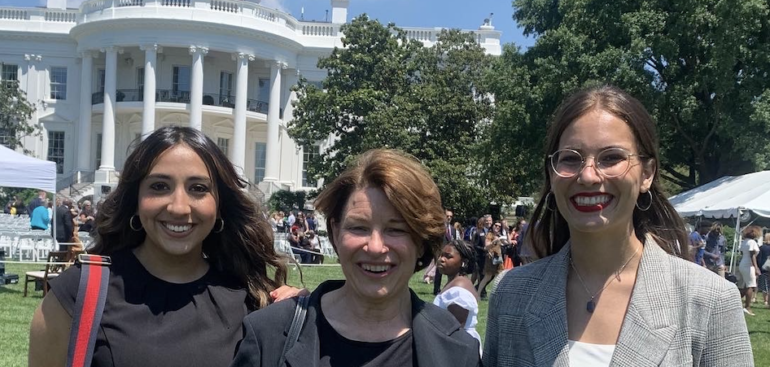By: Yasmin Campos-Mendez and Montserrat Castro Gómez
This week Esperanza United’s Public Policy Manager Yasmin Campos-Mendez and Policy and Advocacy Fellow Montserrat Castro Gómez got to attend a White House ceremony honoring the passing of the Bipartisan Safer Communities Act (BSCA).
It was on the White House south lawn, hosted by President Biden who was joined by 80 members of Congress (including co-sponsors and champions of the bill — Senator Chris Murphy (D-CT), Krysten Sinema (D-AZ), John Cornyn (R-TX), and Thom Tillis (R-NC)), policy-makers, advocates, and most importantly, survivors and families of victims of recent mass shootings, like those in Uvalde, Texas; Buffalo, New York; and Highland Park, Illinois.
We heard four speeches, opening with Dr. Roy Guerrero, a born-and-raised Uvaldian and pediatrician to a number of Robb Elementary students. Vice President Kamala Harris, Garnell Whitfield, Jr. the son of a victim of the recent supermarket shooting in Buffalo, and President Biden spoke as well.
Dr. Guerrero began his speech by noting that 40 days had passed since the shooting at Robb Elementary, and the makeshift memorial in downtown Uvalde had been taken down. “What remains is a hollow feeling in our gut as we drive through our sleepy downtown, which turns to pain and anger as we sometimes approach the grounds of Robb Elementary, a place no one likes to visit.”
Uvalde is located roughly 50 miles from the U.S.-Mexico border and with a population that’s 72% Latin@. In fact, about 90% of the students in Robb Elementary are Hispanic and 81% are economically disadvantaged. We do not ignore these demographics as Esperanza United and much of the Latin@ community continue to mourn the victims.
“I’m using this pain to speak to you today as a Uvaldian and speak for the parents and victims who seek the truth, transparency, and ultimately: accountability,” stated Dr. Guerrero.
Safety and accountability are at the forefront of the BSCA. It is, after all, the first major federal gun safety legislation to become law in almost three decades. The last bill was the 1994 Brady Handgun Violence Act, which passed under the leadership of now President Biden, then-Senator and chairman of the Judiciary Committee. This 2022 BSCA includes key proposals to lessen gun violence by providing mental health treatment, increasing background checks for gun buyers, and funding community prevention programs.
“That’s what we owe all those families represented here today and all over this country the past many years, across our schools, places of worship, workplaces, stores, music festivals, nightclubs, and so many other everyday places that have turned into killing fields,” said President Biden in his speech, the last of the ceremony.
It was thrilling to hear President Biden speak, particularly as this legislation addresses the dating loophole, a critical issue that many survivors, advocates, and policy-makers have been working to close. Previously, federal law prohibited a domestic abuser from having guns, but only if said abuser had been married to, had a child with, or lived with the victim. So it didn’t forbid abusive dating partners from owning or accessing a firearm, even though we know having a firearm present in abusive dating relationships increases the chances that the victim will die.
Although President Biden mentioned that “[the BSCA] closes the so-called ‘boyfriend loophole,’” it is crucial to note that the BSCA narrowed but did not close the dating loophole. The BSCA makes dating violence partners subject to the same restriction on firearms as a spouse in case of a misdemeanor crime of domestic violence. However, only convictions of dating violence after June 25, 2022 (which is when BSCA was signed into law) cause someone to be prohibited from possessing a firearm. Additionally, dating misdemeanants with no prior convictions automatically get their rights to own a firearm restored after five years.
Furthermore, this legislation defines ‘dating relationship,’ with some concerning terms such as ‘recent’ and ‘serious.’ As advocates, we can foresee both of these terms complicating survivor safety. While many dating relationships are easy to identify, because the individuals involved hold themselves out as dating partners, this is not always the case – like in extramarital affairs. Also, it’s common to see relationships move more quickly and intensely in domestic violence situations, meaning an abuser could use the relatively short length of the relationship to try to get through the remaining loophole. Then there are cultural factors, the rise of online dating, and other trends that may make ‘recent’ and ‘serious,’ difficult measures to use.
“Make no mistake about it,” said President Biden in his closing remarks. “This legislation is real progress, but more has to be done… It’s a call to action to all of us to do more.” Esperanza United agrees. We know that in over 50% of mass shootings, the shooter harmed a family member or partner with a firearm. While we celebrate the passage of this life-saving legislation, we call on Congress to fully keep guns out of the hands of domestic abusers, so that we can stop more murders.
As Dr. Guerrero said: “Let this only be the start of the movement towards banning assault weapons.”
